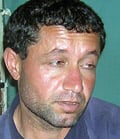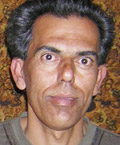Another 24 people (15 from Iraq) have applied in 2006. According to the deputy head of the Refuge Applicants division of the Refugees and Migration department Ruzanna Petrosyan, in contrast to other migrants who wish to get Armenian citizenship, Iraqi refugees only wish to settle down temporarily. The department settles them down in a temporary hostel, takes care of the documentation and gives free legal consultation.
 Twenty-eight year old Rashid Ismayil, who is Yezdi by nationality, came to Armenia from Iraq back in 1999. The refugees department temporarily gave him a place to stay at the hostel belonging to the department on Artsakh street. Rashid has been living in Armenia for the past seven years and has no information whatsoever about his relatives in Iraq.
Twenty-eight year old Rashid Ismayil, who is Yezdi by nationality, came to Armenia from Iraq back in 1999. The refugees department temporarily gave him a place to stay at the hostel belonging to the department on Artsakh street. Rashid has been living in Armenia for the past seven years and has no information whatsoever about his relatives in Iraq.
“They don’t know that I am alive and I am in Armenia,” says Rashid.
He has learned how to speak a little Armenian during the past years. After receiving a four year education in Iraq, Rashid has gone on to work for an asphalt factory. He is currently earning a living in Armenia with work here and there. He sees no future here.
 Taher Abdulamir is 41-years old. He also came to Armenia from Iraq in 1999. He lives in the same hostel, right next to Rashid. In contrast to Rashid, Taher’s parents know that he is alive and that he’s in Armenia.
Taher Abdulamir is 41-years old. He also came to Armenia from Iraq in 1999. He lives in the same hostel, right next to Rashid. In contrast to Rashid, Taher’s parents know that he is alive and that he’s in Armenia.
“I didn’t hear from them and vice versa for the past five years.”
Taher was able to establish contact with his parents during the past couple of years with the help of his friends from Iraq.
“When I left Iraq, there were no cell-phones there, no Internet. Recently, I met an Iraqi-Armenian refugee here whose brother lives in the same region, Basra, where my relatives live. I called his brother, he found my family. I talked to my parents and relatives with his cell-phone and now I can find out how they’re doing everyday,’ says Taher.
Taher works as a night guard in one of Armenia’s factories. At first, he worked in one of the hotels of Armenia, then when the owners found out that he was from Iraq, they fired him.
“I don’t know why they fired me. Perhaps they were afraid of the whole war going on between Iraq and the U.S. After all, there were a lot of Americans staying at the hotel.”
Taher doesn’t really hate Americans, only Bush. He has even tried to move to the States through the UN, but the UN Yerevan office hasn’t considered that appropriate and has promised to send him to Canada.
“They are free to go and come back as they please. We just let them live in Armenia as long as they want,” says Ruzanna Petrosyan. But these people are not able to solve the issue of going and coming back as they please when they barely earn a living. As Taher says, many of them go without food some days.
“The worst thing is that you can stay cooped up in your room, nobody will knock your door, nobody knows whether you’re hungry, alive, or dead. The people here are not bad people. They are simply so poor that they don’t even have the heart to care for others.”
“We don’t have any financial resources to help them out,” say workers from the refugee department, “the Red Cross helps them out a little and some NGOs.”
The social aid programs of the NGOs, however, are mainly aimed towards helping the Armenian refugees of Azerbaijan, while the Red Cross, which used to give 11,200 AMD a month to the neediest, now helps the refugees by providing warmth during the months of winter.
Taher dreams of having a well paid job, get married and start a family. He wouldn’t mind getting married with a local, but his faith and social status might stand in the way.
“The Refugees’ Committee didn’t give me a status even when I had been in Armenia for a year and a half until I told them that I would appeal to the court. They were suggesting that I move back to another country because they thought that society would look at a Muslim refugee differently and I wouldn’t be able to fit in,” says Taher.
But the conflicts with the locals haven’t been that bad and Taher even jokes about it.
“They call me Muslim, they say you’re this, you’re that. I just tell them as a joke-wherever there’s an Armenian, there’s trouble…”
For over a year, Taher wakes up every day with the hope that sooner or later the UN will help him go to Canada.
“Armenia is a very good, peaceful country, but it’s impossible for me to live here. Armenians are the ones leaving the country. It’s amazing to see how you survive-you don’t have gas, oil, a sea…”
